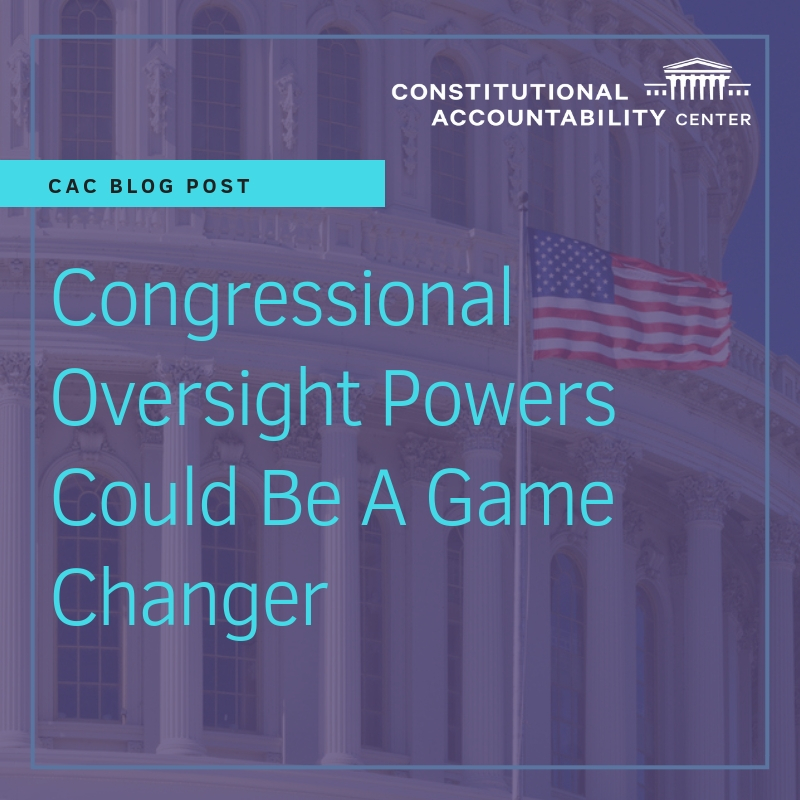Congressional Oversight Powers Could Be A Game Changer
 This year, the power of Congress to oversee the operation of our government could play a critical role in holding the Trump administration accountable to the text, history and values of the U.S. Constitution.
This year, the power of Congress to oversee the operation of our government could play a critical role in holding the Trump administration accountable to the text, history and values of the U.S. Constitution.
The structure of our Constitution and its separation of powers give Congress the authority to oversee the operations of the two coordinate branches of government, the executive and judicial branches. This empowers Congress to act as a watchdog over the President and the numerous federal agencies that affect so many aspects of our lives. Oversight allows Congress, the branch of our federal government chosen most directly by the American people, to hold the President accountable through committee hearings, discussions between congressional committee staff and senior members of the executive branch, subpoenas, and even presidential impeachment proceedings and conviction trials.
These oversight powers could be a profound game changer for this administration, as many of President Trump’s top aides—perhaps even President Trump himself—are under ongoing investigation by Special Counsel Robert Mueller. In a House of Representatives under the leadership of incoming House Speaker Nancy Pelosi, robust oversight, almost entirely absent from Congress over the past two years, could now bring to light new information. Increased scrutiny comes at a critical time, as evidence mounts of Russian collusion with the Trump campaign to interfere with the 2016 election.
Since President Trump took office in 2017, his administration has taken a variety of actions that undermine our nation’s commitment to the Constitution’s text, history, and values. These actions include issuing a travel ban against people from Muslim-majority countries, creating a ban on military service by transgender individuals, designating Matthew Whitaker to serve as Acting Attorney General without the Senate’s advice and consent, and threatening to issue an executive order contradicting the Fourteenth Amendment’s explicit guarantee of birthright citizenship. Along the way, many in America have joined the fight for checks and balances within the U.S. government. Millions have taken to the streets in protest, while some courts have blocked unconstitutional Trump administration moves that would damage our democracy. In 2019, Congress has the opportunity to do its part to defend the Constitution by flexing its muscles of oversight, muscles that atrophied in the prior Congress.
This history of Congress exercising its power of oversight is nearly as old as the Republic. Congress first addressed its oversight powers over executive affairs in 1792, when the House voted down a resolution that would have allowed the President to investigate the U.S. Army’s defeat in the Battle of the Wabash. In place of that resolution, the House passed an alternate resolution allowing a House investigative committee to explore that issue, and several Framers, including James Madison, voted in favor. Since that time, Congressional investigations have become a core part of Congress’s activities, providing a critical check on the Executive Branch and aiding Congress in overseeing the Executive Branch and gathering information that will help it fulfill its legislative function.
In 2019, the Constitutional Accountability Center’s litigation team will continue fighting to uphold the rule of law and challenge violations of America’s Constitution. CAC will be continue our efforts to hold President Trump accountable for violating the Constitution’s Foreign Emoluments Clause, continuing to represent nearly 200 members of Congress in the historic lawsuit we filed against President Trump for violating the Constitution’s Foreign Emoluments Clause. This month, we will be watching the hearings for President Trump’s nomination of William Barr to be U.S. Attorney General, and evaluating his commitment to holding President Trump and his administration accountable to the whole Constitution’s text, history, and values. Until a permanent Attorney General is in place, however, President Trump’s designation of Matthew Whitaker to serve as Acting Attorney General remains unconstitutional. The lawsuit we, along with Protect Democracy, have filed on behalf of Senators Richard Blumenthal, Sheldon Whitehouse, and Mazie Hirono, to hold President Trump accountable to the Constitution’s Advice and Consent Clause remains pending.
Constitutional Progressives have a great deal of work to do in the new year, but we are dedicated to fighting for the text, history, and values of our nation’s founding charter and are ready to take on the monumental battles that await our country in the year ahead. Let’s get to work!
